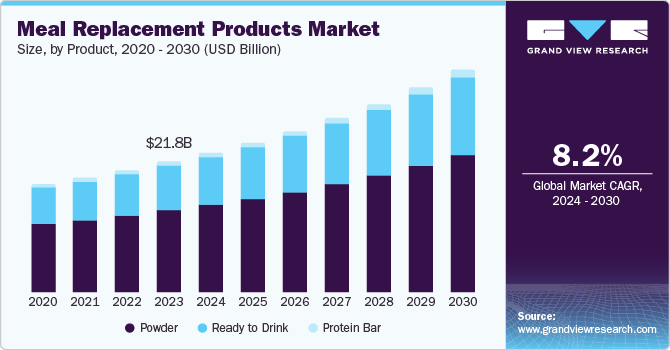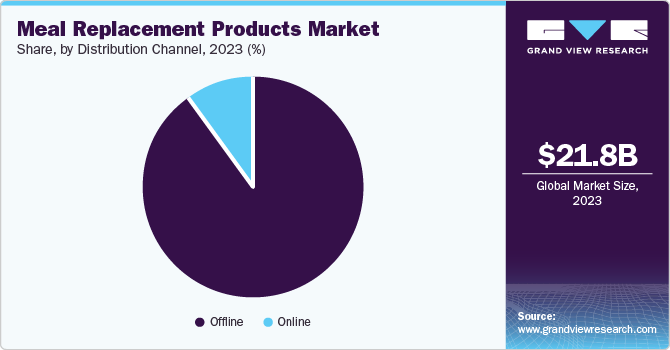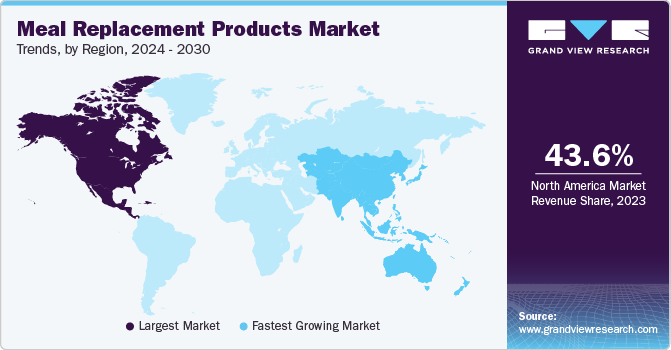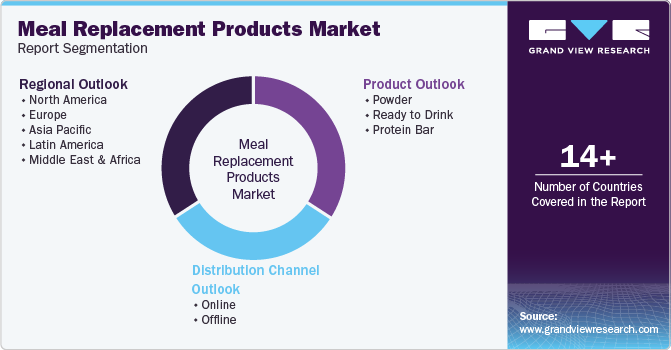- Home
- »
- Consumer F&B
- »
-
Meal Replacement Products Market, Industry Report, 2030GVR Report cover
![Meal Replacement Products Market Size, Share & Trends Report]()
Meal Replacement Products Market (2024 - 2030) Size, Share & Trends Analysis Report By Product (Powder, Ready-to-Drink, Protein Bar), By Distribution Channel (Online, Offline), By Region, And Segment Forecasts
- Report ID: GVR-3-68038-580-9
- Number of Report Pages: 80
- Format: PDF
- Historical Range: 2018 - 2022
- Forecast Period: 2024 - 2030
- Industry: Consumer Goods
- Report Summary
- Table of Contents
- Segmentation
- Methodology
- Download FREE Sample
-
Download Sample Report
Meal Replacement Products Market Summary
The global meal replacement products market size was valued at USD 21.75 billion in 2023 and is projected to reach USD 37.28 billion by 2030, growing at a CAGR of 8.2% from 2024 to 2030. The increasing prevalence of lifestyle-related ailments such as obesity, diabetes, and cardiovascular diseases has heightened consumer awareness about the importance of weight management and healthy eating habits.
Key Market Trends & Insights
- North America meal replacement products market dominated the global market with the largest revenue share of 43.6% in 2023.
- The U.S. meal replacement products market is expected to grow significantly over the forecast period.
- Based on product, the powder segment accounted for the largest revenue share of 62.8% in 2023.
- Based on the distribution channel, the offline channel dominated the market with the largest revenue share in 2023.
Market Size & Forecast
- 2023 Market Size: USD 18.25 billion
- 2030 Projected Market Size: USD 37.28 billion
- CAGR (2024-2030): 8.2%
- North America: Largest market in 2023
- Asia Pacific: Fastest growing market in 2023
This has led to a surge in demand for meal replacement products, which offer convenient and nutritionally balanced options for those looking to manage their weight or improve their overall health. The busy lifestyles and time constraints have made meal replacements an attractive alternative to traditional meals, providing a quick and easy solution for maintaining a healthy diet on the go. The rising disposable incomes and urbanization in various regions have also contributed to the market’s growth, as more people can afford and access these products. Furthermore, the growing popularity of plant-based meal replacements and the continuous innovation in product formulations to enhance taste and nutritional value are expected to expand the market.
The increasing fitness and wellness trend, particularly among millennials and Gen Z, is significantly boosting the demand for meal replacement products. These consumers are more inclined to maintain a healthy lifestyle and actively seek products that support their fitness goals. Furthermore, key industry players' increasing investment in marketing and promotional activities is helping to raise awareness and drive sales. Companies are leveraging social media, influencer partnerships, and targeted advertising campaigns to reach a broader audience and educate consumers about the benefits of meal replacement products.
Product Insights
The powder segment accounted for the largest revenue share of 62.8% in 2023. The convenience and versatility of powdered meal replacements make them popular among consumers, particularly those with busy lifestyles and fitness enthusiasts. These products are easy to store, have a long shelf life, and can be quickly prepared by mixing them with water or other liquids, making them an ideal option for on-the-go nutrition. The growing awareness of health and wellness has also increased the demand for meal replacements that support weight management and provide balanced nutrition.
The ready to drink segment is expected to grow at the fastest CAGR of 8.7% over the forecast period. The increasing consumer awareness about health and wellness leads to a higher demand for convenient, nutritious alternatives to traditional meat products. Environmental concerns and the desire to reduce carbon footprints motivate consumers to choose plant-based options. The advancements in food technology have also enabled manufacturers to create products with improved taste, texture, and nutritional profiles, making them more appealing to a broader audience. Furthermore, the rising popularity of vegan and vegetarian diets, particularly among younger generations, significantly contributes to the market’s expansion.
Distribution Channel
The offline channel dominated the market with the largest revenue share in 2023. Traditional retail outlets, such as supermarkets and specialty stores, continue to be the preferred choice for many consumers who value the ability to physically inspect products before purchasing. The established trust and familiarity with these offline channels also play a significant role in their sustained popularity. These stores' extensive distribution networks and strategic locations also ensure easy accessibility for a wide range of consumers, further bolstering their market share. Moreover, offline channels often provide personalized customer service and immediate product availability, key advantages over online shopping.

The online channel is expected to grow at the fastest CAGR over the forecast period. The increasing penetration of the internet and the widespread use of smartphones have made online shopping more accessible and convenient for consumers. Additionally, the COVID-19 pandemic has accelerated the shift towards e-commerce, as more people have become accustomed to the convenience of shopping from home. Online platforms also offer a wider variety of products and brands, often at competitive prices, which attracts a diverse customer base. Furthermore, advancements in logistics and delivery services have significantly improved the efficiency and reliability of online shopping, enhancing customer satisfaction. Integrating advanced technologies such as AI and machine learning in online retail has also personalized the shopping experience, making it more engaging and tailored to individual preferences. These factors collectively contribute to the robust growth of the online channel in the market.
Regional Insights
North America meal replacement products market dominated the global market with the largest revenue share of 43.6% in 2023. The region’s high consumer awareness and acceptance of meal replacement products, driven by a strong focus on health and wellness, play a crucial role. Additionally, the presence of major market players and their extensive distribution networks ensure the wide availability and accessibility of these products. The growing trend of busy lifestyles and the need for convenient, nutritious meal options further fuel the demand in North America. Moreover, the region’s advanced food technology and innovation capabilities contribute to developing high-quality meal replacement products that cater to diverse consumer preferences. These factors collectively reinforce North America’s leading position in the global market.

U.S. Meal Replacement Products Market Trends
The U.S. meal replacement products market is expected to grow significantly over the forecast period. Increasing health consciousness among consumers is driving the demand for convenient and nutritious meal options. The busy lifestyles of many Americans also contribute to the popularity of meal replacement products, as they offer a quick and easy solution for maintaining a balanced diet. Additionally, advancements in food technology have led to the development of more appealing and diverse meal replacement options, catering to a wide range of dietary preferences and needs. The growing trend of fitness and wellness, coupled with the influence of social media and health influencers, further boosts the market’s expansion. These factors collectively create a favorable environment for the robust growth of the U.S. meal replacement products market.
Europe Meal Replacement Products Market Trends
Europe's meal replacement products market is identified as a lucrative region. The region's growth is attributed to growing consumer awareness about health, fitness, and balanced nutrition, which is anticipated to drive market growth. Furthermore, the growing number of aging people in Europe and rising disposable income are anticipated to boost the demand for meal replacement products.
Asia Pacific Meal Replacement Products Market Trends
Asia Pacific meal replacement products market is expected to grow at the fastest CAGR of 9.8% over the forecast period. Rapid urbanization and the rise of a busy, fast-paced lifestyle among the working population are driving the demand for convenient, nutritious meal options, making meal replacements an attractive choice. Furthermore, rising disposable incomes in emerging economies such as China, India, and Japan are expected to drive market growth.
Key Meal Replacement Products Company Insights
Some key companies in the meal replacement products market include Soylent, Abbott Nutrition, Unilever, Nestle, Herbalife, and others. Companies are focusing on launching new flavors and increasing product ranges. Moreover, key players are taking several strategic initiatives, such as mergers and acquisitions and partnerships with other major companies.
-
Abbott Nutrition plays a significant role in the meal replacement product market by offering various science-based nutritional solutions to support different health needs. It provides a wide range of products designed for infants, children, and adults, including specialized nutrition for those with specific health needs. The company’s most well-known meal replacement product is Ensure. This product offers balanced nutrition with essential vitamins and minerals, making it suitable for adults to maintain weight and improve nutrition.
-
Nestlé plays a significant role in the meal replacement market through its subsidiary, Nestlé Health Science. It offers a range of meal replacement products designed to provide balanced nutrition, support weight management, and promote healthier dietary choices.
Key Meal Replacement Products Companies:
The following are the leading companies in the meal replacement products market. These companies collectively hold the largest market share and dictate industry trends.
- Soylent
- Abbott Nutrition
- Unilever
- Nestle
- Herbalife
- SlimFast
- Wild Oats Markets
- Blue Diamond Growers
- General Mills
- Glanbia
Recent Developments
-
In September 2024, Arla, Danish dairy major, launched meal-replacement milk-based drinks range in Denmark. The new range will be rolled out in the Netherlands and England following its domestic launch.
-
In January 2024, global nutrition science leader Abbott introduced its new PROTALITY brand, a high-protein shake designed to aid adults in weight loss while preserving muscle mass and ensuring optimal nutrition.
Meal Replacement Products Market Report Scope
Report Attribute
Details
Market size value in 2024
USD 23.30 billion
Revenue forecast in 2030
USD 37.28 billion
Growth Rate
CAGR of 8.2% from 2024 to 2030
Base year for estimation
2023
Historical data
2018 - 2022
Forecast period
2024 - 2030
Quantitative units
Revenue in USD billion/million and CAGR from 2024 to 2030
Report coverage
Revenue forecast, company ranking, competitive landscape, growth factors, and trends
Segments covered
Product, distribution channel, region
Regional scope
North America, Europe, Asia Pacific, Latin America, MEA
Country scope
U.S., Canada, Germany, UK, France, Italy, Spain, China, Japan, India, South Korea, Australia, Brazil, and South Africa
Key companies profiled
Soylent; Abbott Nutrition; Unilever; Nestle; Herbalife; SlimFast; Wild Oats Markets; Blue Diamond Growers; General Mills; Glanbia
Customization scope
Free report customization (equivalent up to 8 analysts working days) with purchase. Addition or alteration to country, regional & segment scope.
Pricing and purchase options
Avail customized purchase options to meet your exact research needs. Explore purchase options
Global Meal Replacement Products Market Report Segmentation
This report forecasts revenue growth at global, regional, and country levels and provides an analysis of the latest industry trends in each of the sub-segments from 2018 to 2030. For this study, Grand View Research has segmented the global meal replacement products market report based on product, distribution channel and region:

-
Product Outlook (Revenue, USD Million, 2018 - 2030)
-
Powder
-
Ready to Drink
-
Protein Bar
-
-
Distribution Channel Outlook (Revenue, USD Million, 2018 - 2030)
-
Online
-
Offline
-
-
Regional Outlook (Revenue, USD Million, 2018 - 2030)
-
North America
-
U.S.
-
Canada
-
Mexico
-
-
Europe
-
Germany
-
UK
-
France
-
Italy
-
Spain
-
-
Asia Pacific
-
China
-
Japan
-
India
-
South Korea
-
Australia
-
-
Latin America
-
Brazil
-
-
Middle East and Africa (MEA)
-
South Africa
-
-
Share this report with your colleague or friend.
Need a Tailored Report?
Customize this report to your needs — add regions, segments, or data points, with 20% free customization.

ISO 9001:2015 & 27001:2022 Certified
We are GDPR and CCPA compliant! Your transaction & personal information is safe and secure. For more details, please read our privacy policy.
Trusted market insights - try a free sample
See how our reports are structured and why industry leaders rely on Grand View Research. Get a free sample or ask us to tailor this report to your needs.










